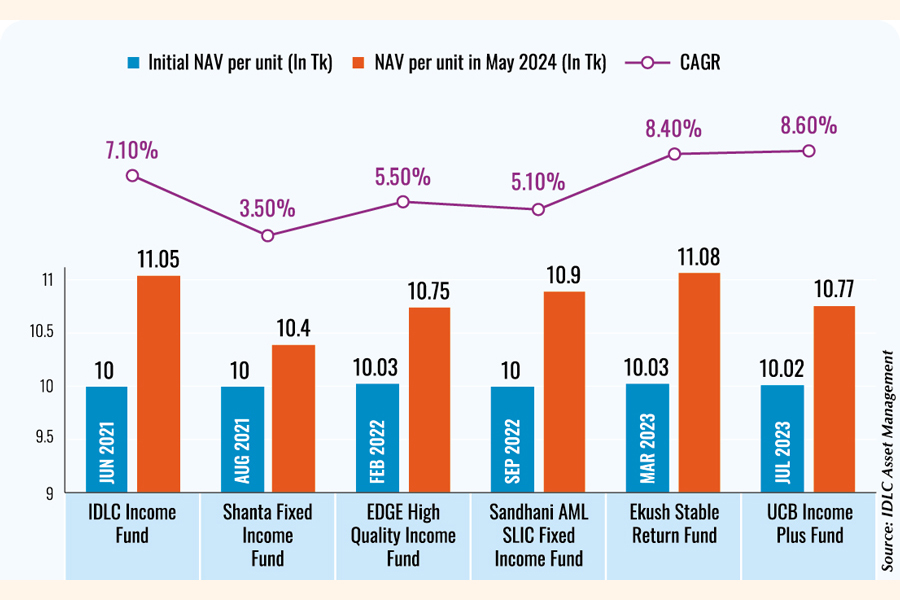Debt funds to pay dividends for FY24, having enjoyed favourable climate

Published :
Updated :

Funds designed to invest in risk-free securities have generated positive returns for FY24 while other mutual funds having a larger share of the money in equity securities endured erosion of assets in the year.
Hence, the MFs that concentrate investments on debt securities are in a comfortable position to distribute dividends to a great relief of unitholders. Other open-ended and close-ended MFs have already expressed their inability to pay any dividend to investors for FY24.
Equity funds were struggling to make profits with floor prices in place on the bourses before January this year. Then the withdrawal of the price restriction accelerated the loss of assets' value in the portfolios.
On the other hand, funds with assets in debt securities got the advantage of rising interest rates and higher yields of Treasury bills and bonds.
In the case of debt funds, asset management companies (AMCs) are allowed to invest at least 80 per cent of the pooled money in Treasury bills and bonds, corporate bonds, and other fixed-income vehicles, with the remaining 20 per cent in stocks. In some cases, the entire fund collected has been injected into fixed-income securities, with a portion in listed debt securities.
Presently, there are 119 equity funds -- open-ended and close-ended -- but the number of debt funds is only six.
The debt funds had already been doing better than equity funds before the monetary tightening because the stock market failed to see any upward momentum for a gloomy economic scenario induced by the Russia-Ukraine war. Then the policy rate hikes and subsequent higher interest rates helped the debt funds further.
At least 60 per cent of the equity funds are required to be in the capital market, with maximum 20 per cent allocated to bonds, and the remaining 40 per cent in the money market.
The CAGR (compound annual growth rate) calculated based on net asset value (NAV) and dividends shows that debt funds are ahead of equity funds.
It is the rate of return for an investment to grow from the beginning balance to the ending balance, considering profits have been reinvested at the end of each period of the investment life span.
The first debt fund, IDLC Income Fund, was launched in June 2021. The net asset value (NAV) was Tk 10 per unit of the debt fund at the time when equity fund IDLC Growth Fund managed by the same asset management company had NAV of Tk 13.17 per unit.
The latest NAV per unit of IDLC Income Fund is Tk 11.05, as of May this year, while it is Tk 9.23 of IDLC Growth Fund.
Total cash dividends distributed by IDLC Income Fund and IDLC Growth Fund are Tk 1.18 and Tk 3.5 per unit respectively. The latter gave a higher dividend out of its retained profit.
However, the CAGR of IDLC Income Fund stands at 7.1 per cent between July 2021 and May 2024, as opposed to a negative CAGR of IDLC Growth Fund for the same period.
The average annualised return of other debt funds ranged between 3.5 per cent and 8.6 per cent from the time of launching till May this year.
Debt funds are performing well when equity funds managed by the same AMCs show negative returns for the period of July 2021 to May 2024, according to IDLC Asset Management.
Arif Khan, vice-chairman of Shanta Asset Management, said the returns of equity funds would go up when the stock market would bounce back.
"Erosion in such funds is also a common thing. But the return of debt funds remains steady."
Apart from IDLC Income Fund, there are five debt funds in the market. They are Ekush Stable Return Fund, Shanta Fixed Income Fund, UCB Income Plus Fund, EDGE High Quality Income Fund, and Sandhani AML SLIC Fixed Income Fund.
Kazi Mashook ul Haq, managing director of IDLC Asset Management, said they did not allocate anything from the debt fund to equity securities.
"That's why the fund continued to generate stable returns since inception. The current rising interest rates would boost the return of the mutual fund further."
mufazzal.fe@gmail.com


 For all latest news, follow The Financial Express Google News channel.
For all latest news, follow The Financial Express Google News channel.